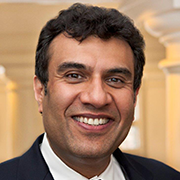
In this special Lifetime Achievement Award Spotlight, we asked this year's recipient Mandeep R. Mehra, MBBS, MSc, FRCP to share career highlights, opinions on the future of heart failure care, and his professional advice on entering a career in the field of heart failure.
Dr. Mehra will receive the award at the HFSA Annual Scientific Meeting 2024 on Saturday, September 28. Learn more >>
Read Mandeep Mehra's full bio >>
Q&A
Please share with us some “highlights” from your distinguished academic career that have significantly impacted the field of heart failure.
In the field of cardiac transplantation, our research has focused on using intravascular ultrasound and intra-coronary angioscopy to identify the natural history, risk markers, morphology, and prognosis of Cardiac Allograft Vasculopathy, which remains the Achilles' heel for late survival in cardiac transplantation. We introduced survival-enhancing immunosuppression in Black transplant recipients to decrease outcome disparities and developed non-invasive gene expression profiling-based transcriptomic biosignatures for detecting immunological quiescence and rejection. Internationally, we pioneered the development of the first practice guidelines for listing criteria for cardiac transplantation candidates and established a standardized nomenclature for classifying cardiac allograft vasculopathy and antibody-mediated rejection. During this period, we also studied the obesity paradox and discovered the relationship of reduced natriuretic peptide expression in obese heart failure patients. Subsequently, our team shifted focus to introducing novel engineered left ventricular assist devices for advanced heart failure, culminating in the introduction of the current generation HeartMate 3 pump. A key ongoing pursuit is building pragmatic trials in advanced heart failure to transition from anecdotal medicine to evidence-based science.
In your opinion, what are important next steps in research to improve heart failure care?
In heart failure, embracing gene-editing to modify heart failure due to monogenic disorders, employing artificial intelligence for early detection of cardiomyopathy in populations, and advancing technology for biosensors and treatments aimed at myocardial recovery are critical next steps. Additionally, advancing implementation science and addressing disparities in heart care access are paramount. Major advancements are anticipated from biologics akin to vaccines that target key risk factors for heart failure development, such as lipid-lowering therapies, hypertension control, and obesity management. Empowering patients for lifestyle changes and shifting focus from disease management to health promotion will be essential.
Over the years, you have served in many key and critical roles within the Heart Failure Society of America. What do you consider to be some of the pivotal activities that you have led within our Society?
My tenure in various leadership roles within HFSA, including as society president, has been transformative, enabling us to focus on mentoring young trainees, establishing advanced heart failure and transplant cardiology as a specialty, stabilizing society finances to support advocacy, scientific growth, and community-wide education. The development of the heart failure certification program has been a personal commitment aimed at equipping clinicians with essential skills for heart failure management.
What do you think are new opportunities to grow the Heart Failure Society of America that will enhance its role as a leader amongst professional societies engaged in heart failure education, research, advocacy, etc.?
HFSA's leadership in the field can be further strengthened through strategic partnerships with international societies, enhancing the impact of scientific contributions via the Journal of Cardiac Failure (already well-led by Drs. Mentz and Lala in their unique style of community engagement), fostering the next generation of heart failure leaders, and influencing research through career development awards supported by the HFSA foundation. Integrating patient advocate leaders in heart failure will also play a crucial role in advocacy and therapy implementation.
What advice do you have for early career professionals who are entering the field?
There is no other field in cardiovascular medicine that offers the blend of clinical expertise and holistic patient engagement found in heart failure care. Embrace this field wholeheartedly, challenge prevailing ideas, cultivate strong professional networks and friendships, seek mentorship actively, and approach your work with passion and dedication to achieve success in heart failure.
About the HFSA Lifetime Achievement Award
The HFSA Lifetime Achievement Award is presented by the Executive Council of the HFSA. The purpose of this award is to recognize a lifetime body of work by an individual who has made a significant and sustained contributions to the field of heart failure.
